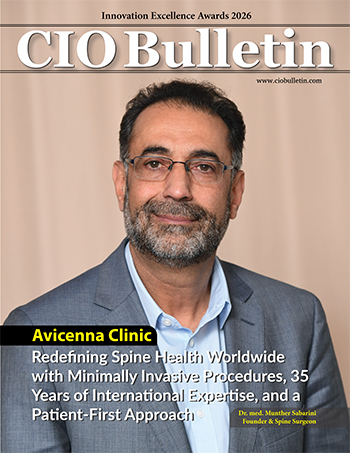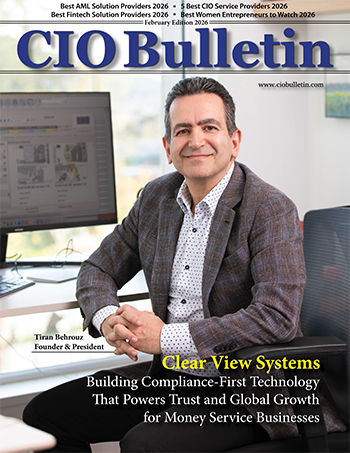30 Admired Companies to Watch 2021
CIO Bulletin

We live in a data-driven world where data has the potential to optimize business performance, transform operations, improve ROI, provide better insights and maximize human potential. Despite the immense traction it gained in recent times; there has always been a problem around analyzing unstructured data. Organizations are now looking for ways to analyze unstructured data to get the most value out of their information. Unstructured data has immense business value, but many companies have not yet managed to yield insights due to the challenges in analyzing unstructured data. Some of the challenges posed by unstructured data are continuous expansion, conventional systems, poor data quality, and irrelevant information.
Globally, there are various companies specializing in providing solutions for unstructured data analysis, But Adlib stands out from the rest. Adlib’s main motto is to create intelligent data that amplify human potential and maximizes business performance. Adlib content intelligence and automation solutions make it easy to discover, standardize, classify, extract, and leverage clean structured data from complex unstructured documents. Across all functions, from Risk to Finance, to IT and Operations, Adlib is ready to help enterprise unearth new market opportunities, reduce risk, simplify compliance, and enter a whole new level of performance. We had a word with Peter Duff, the Founder & Chief Product Officer at Adlib, to know more about the company.
How did Adlib get launched?
The company started in 1998 based on a job awarded to two small companies. Founder and SVP of Market Strategy, Scott Mackey, worked with his father in one company that was involved in the document management space. I worked with a business partner in the other company that built software for industrial and business automation. The job was to make content available electronically than to search through that content in a legal discovery process. We distributed the content on a CD. We’ve come a long way. We are now a SaaS company that has continuously built on that original ground-floor capability to enter the content intelligence space. We help many large enterprise organizations in several major industries transform their content. For example, many global pharma companies use Adlib solutions to transmit electronic data to regulators. One global pharmaceutical recently relied on Adlib to send all of its vaccine data related to clinical trials for their submissions to the FDA. We were able to help them significantly accelerate that critical business process.
We now work for 400+customers directly plus 1000smore through partners. We are installed in more than 80 countries. In addition to North America, we are quite strong in the European Union and have clients in Australia and Asia. As we’ve grown geographically, our offerings have become quite diverse, and we’ve certainly grown by many orders of magnitude in terms of workforce and revenues. That healthy trajectory continues today.
At this point in Adlib’s evolution, how do you describe the business?
We help enterprise organizations leverage their content much better than they do today with our solutions. We help them transform unstructured content like documents and emails into structured formats acceptable for downstream systems that can interpret the data. We help our clients extract “stuck” data. Up until now, organizations have just accepted that vast amounts of information are essentially lost. Using our solutions, they’re able to reclaim that lost information and leverage it.
Would you call Adlib a “SaaS company”?
Sure, yes, we are a SaaS company. But we try to think more about delivering customer solutions. So we’re not really selling software. We’re selling the ability for customers to access intelligence from buried information. Software is a means to that end. We want our teams to think not in terms of clients buying SaaS but buying the transformation that the SaaS enables. So, really, you could more accurately call us a content intelligence company.
How do you define "content intelligence”?
Content intelligence is basically taking unstructured content — documents mainly — and leveraging them to derive a higher level of intelligence. That might be extracting data or sharing a document in a way that you couldn’t share before. It might include making documents fully searchable through optical character recognition (OCR). According to 451 Research, “Addressing the Role of Unstructured Data with Object Storage,” “In 2018, 71% of enterprises reported that unstructured data was growing “somewhat faster” or “much faster” than other business data.” Our platform was designed to reverse this trend. Ultimately, it’s the ability to drive that information to downstream systems that operate more effectively with more data that’s transformed to be intelligent. In short, making unintelligent documents “intelligent” so they can help drive business process automation. “With 80% of data being unstructured by 2025”, according to IDC, as quoted by Data Management Solutions Review, the challenge is on, but our content intelligence platform is the answer.
What’s the potential of content intelligence?
It’s absolutely massive. If you only think about governments and large companies and only about the emails and documents created automatically and stored, all the data in those emails and documents is inaccessible and unusable. So content intelligence is the opportunity to do something that couldn’t be done before, to bring that enormous volume of data, and all other unstructured data, to bear roductively on the enterprise. COVID has shone a new light on that value in healthcare. The complexity of getting any data to be expressed consistently across different healthcare units has been shockingly inefficient. If we are to tackle the disease on a global basis, data has to flow. Extrapolate that out into all businesses for purchase decisions and contracts and employment records and business records and all kinds of other data that are just stored in isolated records, just in case that single record has to be read one day. That seems almost crazy. Yet it’s routine. In aggregate, those records are chock full of data that can be leveraged to improve the business in obvious ways and new ways that haven’t even been conceived yet. The potential is really unlimited. Our clients are excited about where they might take it.
So Adlib is in the business of both remediating risk and uncovering opportunity? And innovation?
That’s right. The risk side is often easier to sell because there’s an obvious and immediate value. Using our technologies, an organization’s full risk profile is revealed and then maintained. But after that, the technology starts to be appealing as a competitive tool for better understanding customers and making better business decisions. That’s one of the promises of big data. And unstructured data brought to life makes big data much bigger, thus not only fulfilling the promise but enlarging it.
These days, every large enterprise has built an innovation team, usually with a C-level executive who focuses on innovation and data. They’ve all got data-transformation projects. They’ve all hired data scientists. But in many cases, they’re missing the data. That’s where Adlib comes in. Our solutions are like the final missing piece in multi-million-dollar data transformation investments — the piece that unleashes the full ROI.
Describe some business challenges your content intelligence platform can be applied to?
One of our big product pushes is in contracts. Almost all contracts are documents not live data. Large corporations with thousands of contracts have not traditionally been able to make sense of these massive collections of documents without hiring teams of lawyers to sift through mountains of agreements by hand. Contracts exist across many different verticals and functions but are a major issue in financial services, life sciences, pharmaceutical, law, and insurance. Often, the most pressing concern is regulatory compliance. When regulations change — and they do quite frequently — you must know what’s in every contract. By automating access to that information, our clients can accurately assess risk and ensure compliance in a fraction of the time it would normally take.
Also, with insurers, we help route documents more efficiently to process claims far faster, literally in minutes versus days or weeks. Customers who need that money because something terrible has happened are thrilled.
Brexit is another interesting one where jurisdictions have changed and thus governing law. The implications of that change are enormous from a contractual standpoint. Reading every contract is almost humanly impossible, certainly painfully slow, and extremely expensive. We can automate it all.
LIBOR is a second example, where regulations changed overnight. LIBOR wasn’t on anyone’s radar, until it absolutely needed to be. The problem; it’s embedded in millions of contracts. And they all must be amended. The sobering reality is that entire legal teams will take months of manual labor to make sure exposure is found and fixed. Our Contract Analytics Solution is an economical way to find, analyze, and cleanse LIBOR exposure from every single contract an organization holds.
M&A is third example where our platform delivers. 46% of dealmakers surveyed by Deloitte said that less than half of their M&A transactions over the past two years have generated the expected value or ROI. The most important factors in achieving a successful M&A hinge upon a) accurate valuation of targets and b) executing on post-close integration to create value. But many business leaders don’t realize their inherited contract documents will steal away the M&A ROI they were banking on. Our Content Intelligence for M&A takes care of the data side of M&A, so you can reach ROI in months, not years.
Should all enterprises be on that path you mentioned?
I believe that there won’t be much choice. Digital transformation is a response to a rising competitive threat and an opportunity to lead your industry. The digital businesses are showing the way. Think of Priceline or Airbnb. The valuation of Airbnb is greater today than Hilton’s value, and Airbnb doesn’t own any property. You’ll often hear about companies, such as big insurers, boasting about having been in business for over 100 years. That actually means that they’ve got processes that could be almost that old, systems so difficult to change that digital insurance companies can come along and supersede them virtually overnight. That’s why digital transformation is so important. It’s the way out of legacy encumbrances and the way into a future that has already arrived.
Based on these trends, where is Adlib going strategically?
As content intelligence gets more and more important, and organizations understand their customers more and more so they can make better decisions, we are going firmly in that direction with a strong overlay of AI. We are developing a whole generation of AI-based technology for doing business differently. We want to be the provider able to crawl through that data, extract the important bits, and channel them intelligently for dramatic downstream business performance.
What are customer relationships like at Adlib?
We are very fortunate. We have many long-term customers. We’re proud of the fact that we’ve built those strong relationships. The word is overused, but we consider many of our customers to be partners because of how we understand where their businesses are going and how we are supporting that growth. Our customers challenge us at times to do different things with our technology, to push it further, which of course gives us ongoing opportunities to innovate. They provide plenty of feedback and direction that benefits both them and us.
What's the culture like inside Adlib?
We’ve tried to develop a culture where our people feel invested in the company. We don’t try to assimilate people with a rule-from-the-top attitude. We like to embrace the ideas of our people so we can get better as a company. Nobody knows everything. Nobody really understands what they don’t know. When you bring new people into the organization, you give yourself the opportunity to access new experiences and new ways of doing things. We work to have an open culture where people get to ask questions, suggest things, and question why we do things in certain ways. We encourage the discussion. People who join us are usually very excited about being part of an organization with that degree of openness.
What awards has Adlib won?
There have been quite a few. This past year, we were named among the “Best Workplaces in Technology 2020,” and, for the third year in a row, we earned a “Great Place To Work” award. In the insurance market, we were awarded InsurTech’s “Top 20 Solutions Providers 2020,” and in life sciences, we won “Most Promising Pharma & Life Sciences Tech Solution Providers 2020.”
What would you like Adlib to be admired for?
Two things. First, innovation — the solutions we bring to market. They are unique and powerful. And second, our customer partnerships. We’ve had customers, many of them multi-billion-dollar enterprises, say that Adlib has set the standard for enterprise support in their organization. That feels validating because we work hard at being that kind of partner—the kind of company you want to keep.
Meet the leader behind the success of Adlib
Peter Duff is the Founder & Chief Product Officer of Adlib. He is a leading expert on unstructured data and has over 20 years of experience in the industry. He shares his passion on the latest strategies and best practices in applying SaaS-based AI innovations to unstructured content intelligence challenges. Peter holds a B.Sc. in Electrical Engineering from Queen’s University, and a Master’s degree in Information Science from the University of Toronto. Peter is a father of two, he spends his downtime following his passion for endurance mountain biking and, in true Canadian fashion, cheering for the Maple Leafs.
“Our content intelligence and automation solutions make it easy to discover, standardize, classify, extract, and leverage clean structured data from complex unstructured documents. In doing so, our global customers reduce risk, simplify compliance, accelerate customer experiences and achieve a new level of business resilience and agility.”

Insurance and capital markets







